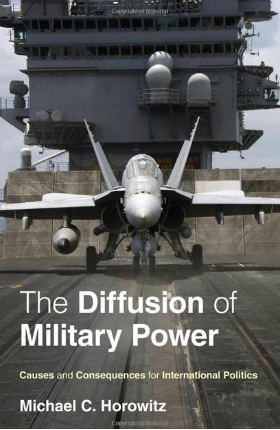Thomas E. Ricks's Blog, page 70
January 6, 2014
N.C. politician resigns in Klingon

I wish he would join the Navy and serve on the USS Zumwalt under Captain James Kirk. Nothing doing! In his resignation letter he
promises to return in victory. Very Klingish of him.
January 3, 2014
Rebecca's War Dog of the Week: Happy (Last?) Holidays from Afghanistan

By Rebecca Frankel
Best Defense Chief Canine Correspondent
We just received this holiday postcard of MWD Grady, posing
in a Santa hat. The chocolate lab is stationed at Camp Leatherneck with his
handler, Marine Cpl. Eddie Garcia. Rest assured, this team is in good company
as they're stationed with a small but awesome group of dog teams for the rest
of their deployment. It's worth noting, as we enter our fourth year of our War
Dog of the Week feature, that this could be our last holiday postcard from
Afghanistan.
Happy new year, all.
Michael Horowitz's fine study of how and why military innovations are adopted

Over Christmas break I finally read Michael Horowitz's The Diffusion of Military Power, a terrific study
of why some nations are able to innovate militarily, or imitate the innovations
of others, while others are not.
Among his findings:
Quick technological change is hard, but sweeping organizational change
is far harder. The thesis of the book is that "adoption capacity, the
combination of financial intensity and organizational capital possessed by a
state, influences the way states respond to major military innovations."
Horowitz shows that is not just a theory but a brilliant diagnostic tool. You
won't think the same way about Chinese aircraft carriers after reading this
book.
Hence, "innovations requiring disruptive organizational
transformations but relatively reasonable financial investments, like blitzkrieg
... will spread haltingly."
One danger is for a nation to be the incubator of change, but to fail
to really adopt it. As you might expect, he cites the Royal Navy's failure with
aircraft carriers. Aside from the Taranto raid of 1940, "the British never
really utilized carrier forces for independent strike operations or centered
their naval forces on carriers."
Carrier warfare is especially interesting because it such an extreme
example of high financial costs and major organizational change. Many more
countries have gotten out of the carrier business than are in it now, even
though it is clear that sea control requires control of air over the sea.
The younger a terrorist organization is, the more likely it is to
adopt the tactic of suicide bombings. This variable appears more important than
whether or not an organization is religious in orientation -- though the odds
are highest when an organization is both young and religiously motivated.
More to come focusing on the warnings this fine book offers to today's
U.S. military.
Want to make the military more effective?: Address the problem of sexual assault

By Robert Egnell
Best Defense guest columnist
If you,
like me, are a soldier, this is going to be a painful read.
The
issue of sexual assaults within the military took center stage in the wake of a
Pentagon announcement that the number of reported cases of sexual assault had
increased by 46 percent during the last fiscal year -- a number that was
already appallingly high. After many heated Senate debates, during the holidays
President Obama finally signed the sweeping National Defense Authorization Act,
which included a number of new sexual assault provisions. The president also
went further by directing military leaders to review their efforts to prevent
and respond to these crimes. Secretary Chuck Hagel and Gen. Martin Dempsey, chairman of the Joint Chiefs
of Staff, are to report back to President Obama on December 1, 2014. The
directive came with a stern warning: "If I do not see the kind of progress I expect, then we will
consider additional reforms that may be required to eliminate this crime from
our military ranks and protect our brave service members who stand guard for us
every day at home and around the world."
This
begs the question, what is "the kind of progress" he expects, and what will it
actually take to deal with this problem?
Rhetorically,
both lawmakers and ranking officers have been taking the problem very
seriously. In 2012, Gen. Martin Dempsey spoke on behalf of the Joint Chiefs and
argued that "We realize the crime of
sexual assault erodes the very fabric of our profession." The problem is that
the compromise provisions of the National Defense Authorization Act, while
clearly taking some important steps in the right direction, do not come close
to addressing the causes of sexual assault in the armed forces. Instead, the debate
has circled around the symptoms and consequences of these crimes rather than
their root causes. To effectively deal with the problem, we must ask why
soldiers and officers are raping, attacking, and harassing their colleagues,
their brothers and sisters in arms?
If
sexual assault truly were considered an issue that erodes the very fabric of
the profession, we should expect a profound and immediate response from within
the military organization. Instead, the response has taken the meager form of awareness training programs and improvements in the Department of Defense response systems
to these issues, accompanied by a staunch resistance to accept legal changes
that would reform the military justice structure.
What if
the organization does not, in fact, see sexual assault as an attack on the
fabric of the profession? What if the very fabric of the organization is
instead the cause of the prevalence of sexual assaults in the military? The chief
of staff of the Army, Gen. Raymond Odierno, and many others have stressed the
need for cultural change within the organization in order to deal with the
problem of sexual assaults. Very few, however, have dared to specify what the
problem with the military culture is and how it needs to change. This is where
the pain comes in.
There
is a reason why military culture is not seriously challenged -- it is perceived
to be functional, even necessary, for effectiveness on the battlefield. The
core task of military organizations is to fight and win the nation's wars. A
certain type of unit cohesion and military mindset is therefore considered
necessary in order to perform this task effectively. Consequently, young men
and women are recruited and trained into a mindset that matches the
preconceived notion of what constitutes a good soldier and a close-knit and
loyal fighting unit. There is a very well established system for this process.
Through shared physical hardship, "benign abuse" by drill sergeants, hazing by
peers, and traditionally also a rather substantial amount of sexist and
homophobic verbal abuse, soldiers are socialized into good warriors and
fighting buddies. The ideal end result is a well-oiled, loyal, and highly
aggressive fighting unit, that also often bears the characteristics of "hyper masculinity"
-- stressing the stereotypes of physical strength, courage when facing physical
threats, aggression, and sexuality. No one should therefore be surprised that
military life also includes strip clubs, pornography, and binge drinking --
most often seen as "necessary" but unofficial forms of male bonding for unit
cohesion.
However,
when the core task of an organization is the effective application of organized
violence, this violence must also be carefully constrained. Soldiers or units
that direct their violence and aggression -- sexual or not -- against their
peers, subordinates, or commanding officers, or that kill and rape the local
population, become strategic liabilities -- especially in an environment of
constant and global media coverage informed by anyone with a mobile phone.
The
warrior ideal, in its current exaggerated hyper-masculine form, has a very dark
side of the same coin -- it fails to constrain violence to a large enough
extent. The failure to achieve long-term success in Afghanistan and Iraq can
certainly not be blamed solely on military culture, but it is at the same time
clear that the epic disasters ranging from an overly aggressive stance of many
infantry units in the early stages of the reconstruction phase in Iraq, to
abuse in Abu Ghraib, the massacre in Haditha, and Quran burning and body urination incidents in
Afghanistan, have all had profound strategic consequences that almost no amount
of positive work could salvage.
The
official defense in most high-publicity cases is that these events are never
the sign of a fundamental cultural problem, but the isolated acts of a few
rotten eggs in an otherwise perfect organization. "Any big organization has
them..." The exact same analysis is made with reference to sexual assault. Again,
the response is to deter these rotten eggs through new legal procedures, by
teaching commanders to recognize sexual assault when they see it, and by making
it easier for victims of assault to report these crimes.
Instead,
to resolve the problem of sexual assault in the armed forces, military
organizations need to deal with the root of the problem -- the military culture
it has created and promoted in the first place. That means going back to the
drawing board regarding its view of the ideal soldier, what type of
characteristics should be sought after by recruiters, what type of values should
be emphasized in soldier and officer training, the way we can achieve unit
cohesion, and what we reward as appropriate or exceptional behavior.
Researchers argue that it is perfectly possible for humans to distinguish
between different moral boundaries. Thus, creating effective killers (which we
simply cannot shy away from) does not necessarily lead to unintended byproducts
of sexual assaults and war crimes. We can both retain competence within the
core task of the military, while at the same time changing the values and
attitudes towards women, sexual violence, and restraint on the battlefield.
Not
only would such fundamental changes through bottom-up approaches stand a chance
of changing the culture that is connected to the appalling levels of sexual
abuse in the military, it may also produce more effective fighting units that
will stand a better chance of achieving the complex tasks (beyond the massive
use of force) that military organizations are often asked to perform in
contemporary warfare.
Robert Egnell is a visiting professor and director of teaching in the Security
Studies Program at Georgetown University, as well as the senior faculty advisor
for the Georgetown Institute for Women, Peace and Security. He is the author
of Gender,
Military Effectiveness and Organizational Change: The Swedish Model (Palgrave,
forthcoming 2014) and co-author with David Ucko of Counterinsurgency in Crisis: Britain and the
Challenges of Modern Warfare (Columbia 2013). He is also an officer in the
Swedish Army Reserves.
January 2, 2014
While we were out: Pussy Riot, AK-47s, L'il Kim, down with Amos, and more

Kalashnikov
died.
Two members of Pussy Riot were freed from
prison by Putin, who had sent them there for singing in church, uninvited, a
song praying to God for the removal of Putin from office. Sticking to their
guns, they denounced the move as a PR stunt.
In other dictatorial news, L'il
Kim announced that having his uncle whacked was "a
correct decision."
In other family news, a guy running for the
U.S. Senate in Maine said his conviction
on domestic assault charges a decade ago sensitized him to
family issues. Maybe he should become our ambassador to North Korea?
A newspaper near Quantico ran a column
that basically called for Marine Commandant James Amos to step down or, if he
doesn't, to be fired.
Some of the donkey meat treats that Wal-Mart
sells in China turned out to contain some fox.
An Iraq war veteran named Sean
Azzariti was the first person to buy marijuana
legally in Colorado, at 8 am on January 1.
For Christmas, a soldier at Ft. Bragg built a gingerbread version
of Osama bin Laden's compound. No information
about whether he is friends with Sean Azzariti.
December 20, 2013
The Best Defense interview: Steve Coll on White House leaks & what might happen

The
Best Defense is on Winter Break until the new year. Until then, here
are some favorites from the past year. This post originally ran on Mar.
27, 2013.
Steve
Coll, a former managing editor of the Washington
Post and author of Ghost Wars, a favorite book of many readers of this blog, is one of the best
journalists I've ever met. He especially understands intelligence matters,
national security, and Washington. So when he wrote this week in the New Yorker about the possibility of
high-level indictments of national security officials at the Obama White House,
I paid attention. Here is an e-mail interview I
conducted with him:
What
makes you think that there may be indictments of high-level Obama administration
officials down the road?
It's clear that the Justice Department has been
carrying out extensive interviews with current and former senior administration
officials about David Sanger's excellent reporting on the Obama administration's
involvement in cyberattacks against Iran. At the same time, the administration
has established that it is willing to tolerate aggressive leak prosecutions
against current and former government officials. Equally, the White House is
allowing Justice prosecutors to make such decisions without political interference
-- as is proper (See: Richard Nixon). So if you add all that up, indictments
are a possibility.
Have
you talked to David Sanger, or to anyone else at the New
York Times, about the leaks to him? If so,
what did they say?
I have not formally approached the Times or Sanger about this investigation
-- the subject of my New Yorker
reporting was the separate prosecution of former C.I.A. officer John Kiriakou,
who pleaded guilty and became the first C.I.A. officer ever sent to prison for
providing information to the American press. In that longer story, I mentioned
the ongoing Sanger case as context, based on what I picked up along the
reporting trail, and I cited some reporting by the Washington Post, which appeared earlier this year.
Do
you think that the situation with Sanger and high-level Obama administration
officials may have altered the Times's coverage of national security issues? If so, how?
I don't have any reason to think that. The Times, under executive editor Bill
Keller and now Jill Abramson, has had to handle a succession of tricky
editorial and publishing decisions involving classified information, from
Wikileaks to these multiple leak investigations by the National Security
Division at Justice. There was the Kiriakou case, which involved the Times; a separate case involving former
C.I.A. officer Jeffrey Sterling and Times reporter James Risen; and now the
Sanger case. In the Risen and Sanger cases, the Justice investigations have
involved reporting done for books, in addition to reporting done for the Times. My reading from far outside is
that the Times editors have done very
well handling these dilemmas. It's a complicated responsibility, as I can
testify from experience at the Washington
Post. I'm sure there are at least a few calls the editors would like to
have back, but overall I think they've made courageous, responsible decisions
in the public interest.
Who
do you think might be indicted?
I don't know.
Do
you think such indictments would be justified?
Almost certainly not, particularly if they
involve heavy charges under the Espionage Act or other similar statutes, as
Justice has done in previous cases. As my story about the Kiriakou case
outlined, leak prosecutions are highly selective and they fail to take into
account the institutionalized failures and hypocrisy of the government's
management of classified information. David Pozen, a law professor at Columbia
University, estimates in a forthcoming Harvard
Law Review article that fewer than three in a thousand leak violations are
actually prosecuted, and the true percentage, if all leaks of classified
information could be counted reliably, is almost certainly much closer to zero.
These kinds of prosecutions -- aimed, apparently at creating a deterrent effect
-- in an atmosphere of such laxity just can't be justified as public policy,
even if they are permissible as a matter of law.
What does
all this say to you about how Washington (both in politics and journalism) works
these days?
The
Kiriakou case teases some of that out -- it's a very polluted environment.
There's a lot of opportunism from all sides. That's why they call Washington a
swamp. But I think the single biggest factor -- and a factor that could be
fixed -- is the broken system that over-classifies government information by
orders of magnitude. Until the government can credibly distinguish a real
secret from a phony or artificial one, prosecutions of leakers will always seem
selective and without adequate foundation.
December 19, 2013
The FP transcript (Xth and last): What the last 9 segments tell us about the state of the American confrontation with Iran

The Best Defense is on Winter Break until the new year. Until then, here are some favorites from the past year. This post originally ran on Mar. 26, 2013.
[Here are Parts I, II, III, IV, V, VI, VII, VIII, and IX.]
Ricks: We are
almost out of time. Speaking of mutually shared decisions, the U.S. government
is probably going to face one this year on Iran. How has everything we've been
talking about shaped how we are going to be thinking about Iran down the road?
First David, then Michèle.
Crist: Well I
think it's all interrelated -- issues in Afghanistan, issues in Iraq, all
affect how we look at Iran and how we are positioned to be able to do something
about Iran. I think it's all interrelated. Lessons I think have been
institutionalized at least within senior leaders on some of the problems we had
in Afghanistan and Iraq, especially second- and third-order effects. What are
the consequences of different actions we take? What are consequences of
conflict in general? Is regime change a viable option? Isn't it a viable
option? If not, then how do we...? I mean, all that is in the background of
all the discussions. And I think it's been very healthy in many ways.
Ricks: One of the
issues that we've been talking about is the quality of civil-military relations
and straightforward, candid, honest advice from generals to civilian
leaders -- for which we have apparently just seen General
Mattis quietly fired. [Ricks note: I should have said "pushed out early."]
Crist: On the
record I won't comment on General Mattis's views.
I will say and I can say this with a certain honesty since
I've helped draft many of the memos: He has been very candid on what his views
of what needs to be done. I haven't seen anything like the Rumsfeldian approach
to stifling alternative views, and so as a consequence while...And some
people in the U.S. military -- maybe the political leadership isn't as
receptive as they would like on authority issues and some other response...the
dialogue is there, and frankly a lot of it gets to these ideas of what I have
always thought of as one of the intangibles where you have breakdown in
discourse between civilian and military leadership is as you say trust. And a
lot of it is personality based. Just personalities of the individual players
and how they personally get along, as well as concerns of political leadership.
Ricks: And you
have seen a trusting, candid exchange?
Crist: I have
from my level, absolutely. And I've sat in many -- not as many as Michèle and
some of the others here -- but a number of meetings with senior leaders on both
sides of it. And I have seen it be quite candid.
Ricks: My
impression is that the Obama administration has been almost afraid of Centcom
under Mattis and Harward -- the mad-dog symptom with two incredibly aggressive
guys. But I see Michèle shaking her head. Michèle, jump in.
Flournoy: I would
say of all the issue areas that I was exposed to in the deputies committees
process, there was none where we took a more deliberate, strategic,
questioning, and very candid approach than Iran. And it really started back --
this goes a few years back now when it was started up when Gates was still
secretary of defense -- and I think the thought that was put into exactly what
words the president says to describe our objective in Iran: Is it "prevent"? Is
it "contain"? That was debated, the consequences downstream of choosing one
versus the other, multiple senior leader seminars, war games looking at
different options, going down the road of different scenarios, very close
partnership with the military in actually setting the theater so that we are now
communicating a degree of deterrence to back up the policy of sanctions and
negotiations.
So I actually think on Iran, probably more than on any other
issue that I've seen, it's been very strategic, very comprehensive. There's no
idea that you can't bring to the table. There's no idea that hasn't been
debated. And people may have very strong views and disagree. But this is not
one where -- this was one where there was a real constant coming back to what
are our interests? What are our objectives? How do we make sure we are applying
rigor and not just going down the road towards confrontation with no limits or
no boundaries or no sense of what we are trying to achieve?
Crist: I would
add one more point in having looked at U.S.
strategy for a long time on Iran. One thing that I found interesting that
has evolved over the last few years that I haven't seen earlier is looking even
beyond the nuclear issue. What is our long-term relationship with this country?
Are we long-term adversaries? If so, how is that going to play out across the
region? And how do we counteract that? And also, are there areas, I think,
which despite the engagement piece, seemed to have died off, there has been a
lot of thought given -- are there areas where there is mutual cooperation? And
what will that lead to long term? Can we have maybe not rapprochement but some
kind of détente with Iran?
Ricks: So can we
start to get Putin to be aggressive again and drive Iran into our hands?
Crist: Yeah, it's
tough because in my personal opinion we are for a host of reasons adversaries
in the region. We have two different strategic views of what we want out of it.
But the issue is bigger than just the nuclear issue. The
nuclear issue is a symptom, more than a cause, of our problems.
THE END... -- or is
it?
December 18, 2013
Christmas break is here

I am going to break
off from fresh posts 'til the beginning of next year. In the meantime, we'll be
running some memorable posts from 2013.
A 'War on the Rocks' Xmas reading list

I've been reading the blog "War on
the Rocks" with interest, and so am pleased to be able to recommend their year-end reading list. But I still don't understand the blog's name. Does it
refer to running aground or drinking whiskey? Or to something else?
I suspect it is because war is
never "neat."
O! The damage 'Once an Eagle' has done to my Army -- and yes, it is partly my fault

By Maj. Gen. Robert Scales, U.S. Army (Ret.)
Best Defense guest confessor
I was commandant of the Army War College in
1997 when Anton Myrer's widow gave the Army War College the rights to her
recently deceased husband's book, Once an Eagle.
She requested that the college republish the book. We received funds from the
college foundation for the reprint and it has remained in print ever since. On
the flyleaf I wrote that the book:
"Has been a moral compass for me and my family
of soldiers for more than two generations. It's ethical message is as fresh and
relevant today as it was when Anton Myrer wrote it during the war in Vietnam."
The book's lasting attraction for soldiers is
the personal and moral battle within its pages between true and false
officership as embodied by Sam Damon, a former enlisted man and true soldier's
soldier and Courtney Massengale, a West Pointer who embodies all that is evil
among the grasping and politically driven staff officer elite.
My dad was a mustang like Sam. He was a high
school graduate, one of the first to finish Engineer Officer Candidate School
in 1942. Thus he was in the branch at the time densest in West Pointers. He
fought through three wars to retire as a colonel. He gave me a first edition in
1972 and told me to read it as a reminder of what a young West Pointer should
know about the difference between a true combat leader and a "staff officer."
For years the book became a bedside volume and often I would, like many in my
generation who had seen insensitive staff REMFs in Vietnam, warn too-clever
officers not to "act like a Massengale."
Over the post-Vietnam era, virtually every Army
officer read three books. First was This
Kind of War by T.R. Fehrenbach. It remains today as one of the best works
on the Korean War. The enduring value of the book is that it chronicles the
dangers of unpreparedness, a lesson all too familiar to the service that always
suffers the most between wars. The second was Michael Shaara's The Killer Angels, a fictional portrayal
of the Battle of Gettysburg. Neither Shaara nor Fehrenbach were professional soldiers
or military historians, yet both of their books captured the essence of real
war and each taught enduring lessons every officer needed to learn about his
profession.
Of course the third and most revered was Once an Eagle. Four decades of officer
readership has made it both a moral guide for comportment and an indelible
cultural metaphor for the difference between unit command and service on a
staff. Yet after 10 years of war I'm
beginning to question if this cultural icon might have done a generation of the
Army a disservice ... and it's in part my fault.
There have always been two tracks for an
officer's career: command or staff, Sam or Courtney. With reflection I think,
in part as a result of the book, the Army today venerates Sam Damon too much
and castigates Courtney Massengale to its detriment. Its pages might well have
contributed to the conflation of two views of careerism between the good
warrior versus the bad staff officer. Today's generation has spent a great deal
of time in the field and very little in the classroom or on the staff. Many are
unduly contemptuous about serving in the purgatory of the Washington
bureaucracy and treat staff time as an unwelcome interlude between assignments
in the field.
Perhaps the pull of the Sam track has made too
many commanders out of officers whose place is on a staff, and too few
brilliant staff officers who choose to leave right in the midst of their most
productive years because they failed to make the cut for the next command. My
favorite Courtney model is retired Colonel Allen Meyer, who was my staff mate
in the ‘80s in the plans and policy shop on the Army Staff. He was the smartest
officer I have ever known. As a colonel, he ran the classified operation
against the Soviets in Afghanistan at the behest of the Army's chief of staff.
Later, he was President Reagan's speechwriter and wrote the famous "good-bye,
old friend" speech at Arlington that still stirs hearts. Al left too soon.
He went on to great success as an entrepreneur and his drive and brilliance
made him a wealthy man. And, unlike Courtney, he remains a great guy. But I
think not a great infantry combat commander.
My sense is that because too many of the Als
and Courtneys have left, much of the critical brain work in the Pentagon today
is being done by civilian Courtneys. Visit any influential policy shop in the
Pentagon and you'll see bitter senior staff officers willingly taking a back
seat to a young Georgetown M.A. just returned from supporting some political
campaign. The lack of uniformed staff brilliance has over the past decade
distorted both the quality and the impact of the advice that soldiers are
supposed to give to their civilian masters, and that's too bad.
Sam Damons serve well as company and battalion
commanders. Courtney Massengales serve better as senior staff officers. Perhaps
we have too many of the former and not enough of the latter. We need more
officers with Courtney's skill as strategists, officers with the ability to
think in time, who are able to express themselves with elegance, clarity,
conviction, and intellect, and yes, navigate through the swamp of
political-military policymaking.
Maybe it's time to move Once an Eagle from the War College reading list to the used book shelf.
Bob Scales is a retired
Army major general and former commandant of the Army War College.
Thomas E. Ricks's Blog
- Thomas E. Ricks's profile
- 437 followers



